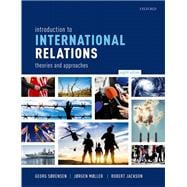
Introduction to International Relations: Theories and Approaches
by Sørensen, Georg; Møller, Jørgen; Jackson, Robert-

Free Shipping on All Orders!
*excludes Marketplace items.
Buy New
Rent Textbook
Rent Digital
Used Textbook
We're Sorry
Sold Out
How Marketplace Works:
- This item is offered by an independent seller and not shipped from our warehouse
- Item details like edition and cover design may differ from our description; see seller's comments before ordering.
- Sellers much confirm and ship within two business days; otherwise, the order will be cancelled and refunded.
- Marketplace purchases cannot be returned to eCampus.com. Contact the seller directly for inquiries; if no response within two days, contact customer service.
- Additional shipping costs apply to Marketplace purchases. Review shipping costs at checkout.
Summary
approaches and their application to the real world, the authors encourage critical engagement with the theories presented, highlighting their strengths, weaknesses, and the major points of contention.
The eighth edition has been thoroughly updated to incorporate current events and key developments in the discipline. The changes include a new, three-part structure, which helps students to build a clear understanding of how key debates in the discipline are connected with each other, and how these
can be applied to the world around them. The first part, 'Studying IR', emphasises the practical reality of international relations in everyday life, and how to connect this reality with the academic study of the subject. The second part, 'Major IR Theories and Approaches', guides the reader through
the essential theories in the field, including Realism, Liberalism, Social Constructivism, Postcolonialism, and Feminism, among others. Finally, the third part, 'Theory Meets the Real World: Policy and Issues', builds on this foundation by exploring how we can understand current issues such as
climate change and terrorism through the lens of IR theory.
A new final chapter, 'The Big Question: World Order or World Chaos?', concludes the text by tracing the development of, and theoretical debates around, the concept of 'world order', providing students with a nuanced and compelling analysis of the key challenges confronting the contemporary world.
Opening with an overview of the concept, the authors go on to examine the consequences of the rise of China and the resurgence of Russian influence, the new issues facing established democracies and parts of the Global South, as well as international institutions and their ability to provide global
governance. The chapter ends with a discussion that answers the question posed at the start: are we witnessing world order or world chaos?
Digital formats and resources
In addition to helpful learning features within the book, the text is accompanied by online resources designed to help students to take their learning further. These include:
For students:
- Reinforce your understanding of each chapter's key themes with short case studies
- Test your understanding and revise for exams with review questions
- Explore different theoretical debates through a series of annotated web links to reliable content
- Test your knowledge of key terminology using the flashcard glossary
- Extend your learning with videos exploring key issues in IR
For registered lecturers:
- Encourage debate and critical thinking in class with seminar resources
- Download figures from the text for use in your own teaching materials
Author Biography
Georg Sørensen, University of Aarhus,Jørgen Møller, University of Aarhus,Robert Jackson, formerly at the University of Boston
Georg Sørensen is Professor Emeritus of Political Science at the University of Aarhus
Jørgen Møller is Professor of Political Science at the University of Aarhus
Robert Jackson was formerly Professor of Political Science at the University of Boston
Table of Contents
Part 1 Studying IR
1. Why Study IR?
2. IR as an Academic Subject
Part 2 Major IR Theories and Approaches
3. Realism
4. Liberalism
5. International Society
6. International Political Economy: Marxism, Mercantilism, Liberalism
7. Social Constructivism
8. Post-positivist Approaches: Post-Structuralism, Postcolonialism, Feminism
Part 3 Theory Meets the Real World: Policy and Issues
9. Foreign Policy
10. Major Issues in IPE: Economic versus Political Power, Development, Globalisation, How to Study the Real World
11. Major Issues in IR: Climate Change, Terrorism, Religion, Power and Hegemony
12. The Big Question: World Order or World Chaos?
An electronic version of this book is available through VitalSource.
This book is viewable on PC, Mac, iPhone, iPad, iPod Touch, and most smartphones.
By purchasing, you will be able to view this book online, as well as download it, for the chosen number of days.
Digital License
You are licensing a digital product for a set duration. Durations are set forth in the product description, with "Lifetime" typically meaning five (5) years of online access and permanent download to a supported device. All licenses are non-transferable.
More details can be found here.
A downloadable version of this book is available through the eCampus Reader or compatible Adobe readers.
Applications are available on iOS, Android, PC, Mac, and Windows Mobile platforms.
Please view the compatibility matrix prior to purchase.
